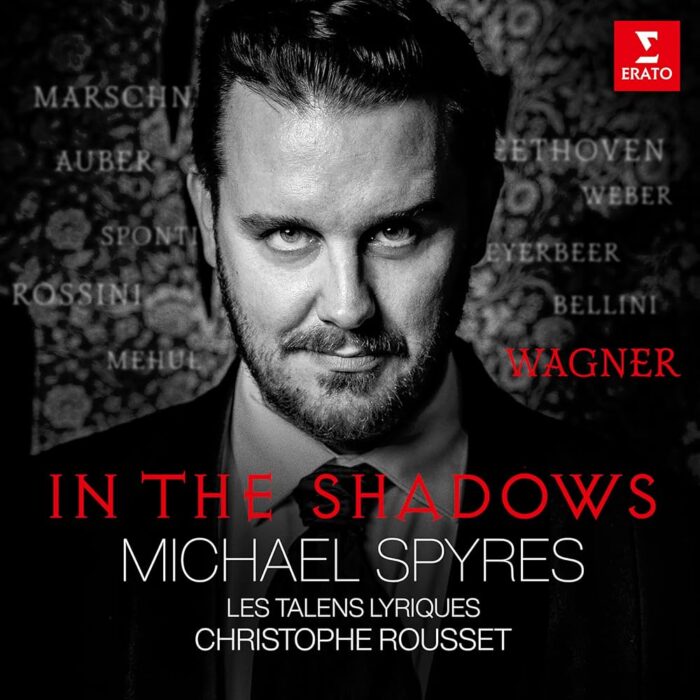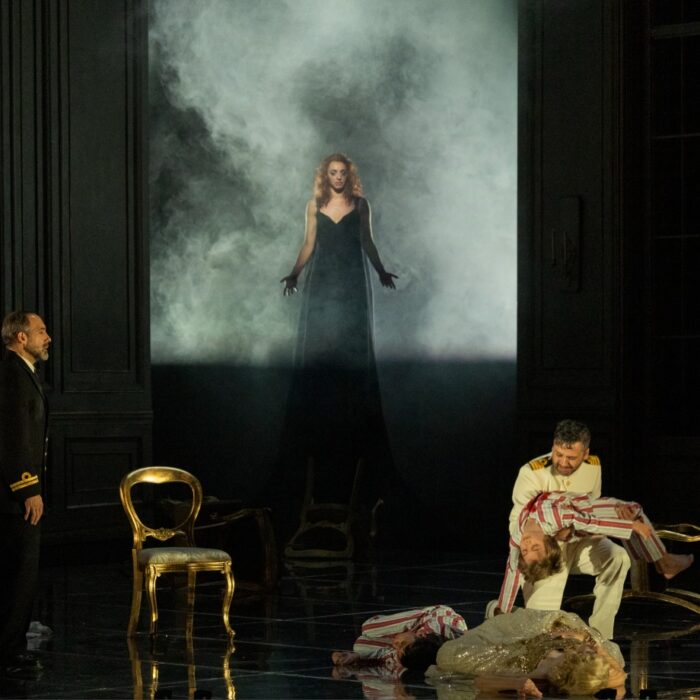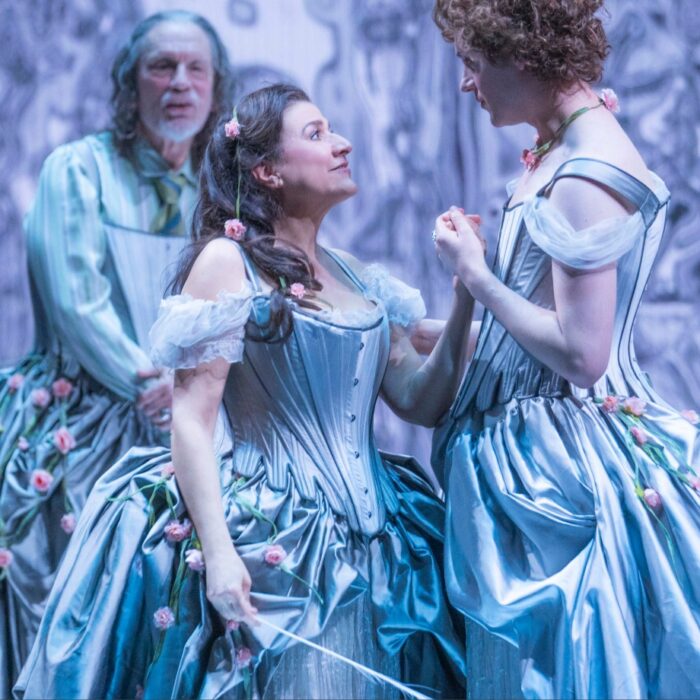
West Edge Opera 2017 Review – Hamlet: Solid Singing Can’t Overcome Opera’s Dramatic Deficiencies
By Lois SilversteinOf course, it is impossible – to rewrite, even for opera, Shakespeare’s masterpiece. It is untouchable, even if the Bard wouldn’t have sized up the various Folios and Quartos and come up with a right-as-rain manuscript.
But, for Ambroise Thomas, in 19th century France, (1868) to tackle the probing young man and make him sing for his supper – well, that’s a job and a half. And, for WestEdgeOpera, Bay Area, to include this five act grand opera in its trilogy of Opera Festival, is biting off more than a meal and a half.
Directed by Aria Umezawa, conducted by maestro Jonathan Khuner and designed by Jean-François Revon, the performance brought to life a unique variation of the play, often Gothic. The audience sat entranced as Thomas’ “Hamlet” wound and rewound its way through the many complexities, complete with Hamlet alive at the end as king: Did it succeed?
As an afternoon of energetic theater, rising up from grand opera’s well of music undefiled, occasional heights of beauty and terror – Aristotle might be pleased – in some of the singing, we could say, a “hit, a hit, a palpable” hit. In terms of long-lasting, deepened understanding of the conflicts the revenge play in its earliest iteration, and its emotional impact, we would say: “Glad you did this, but, we can do with another go.” And do we want to?
The Gothic State of Denmark
From the first, the strange troop of helmet/shielded courtiers who appeared on stage, come to defy. What exactly? We’re here, so listen? Maybe. They certainly set the tough-fisted tone. The sets joining with the ‘décor’ of the warehouse itself – wood, wire, paneled, work-setting ambiance, is an idea, and although the panels/scrim combinations that adorn the stage, the beautiful abstractions seem too clean, too crisp, for what Umezawa calls the rotting state of Denmark. The use of some panels to conceal and convey the death of King Hamlet and the players’ version of Prince Hamlet’s death by Claudius and Gertrude, in shadow play, is also a good idea if a bit too long and lacking clear edges. Too, the costumes – various stages of Goth – and apparently there are several iterations, which, our current era knows and admires – add another external dimension to the work, not essential, but intriguing if you care for that sort of inspiration. The production speaks to various states of Goth, and as such is a plus for those of us to get a better handle on our various neighborhood environments.
Not the Ophelia of Old
Be that as it may, when Emma McNairy as Ophelia, appears on stage for the first of her many scenes – a significant change from Renaissance Shakespeare – her deliberately smudged blue-green eye shadow, jaunty head decoration and floating black redingote does much to further that Gothic mood. It also leads us toward the 21st-century version of the Lydia Languish portrayal typical of Ophelia of old. So too, her assertive expression of love toward her beloved Dane, and her out-right sexual assertiveness. Vivian Leigh begone. When Ophelia and Hamlet make love on a table and Läerte comes upon them, we know we are in for a whole new view of what counts in West Edge’s production. In fact, playing her many scenes, the expressive McNairy’s Ophelia claims more of the stage than Claudius, and, certainly, her father, Polonius. Lots of volume and full top register – she pulls out all the stops many times, some shrieks and all, in her mad scene – she plays the part with gusto, a wide variety of moods and expression, both vocal and dramatic. Not a doubt in the world that she doesn’t care about Hamlet and is going to go to a Nunnery/Cloister willingly.
In fact, the whole stage-business takes up a lot of stage-time. We begin to wonder is Hamlet’s despair mainly because he “killed” off Ophelia, or because the king has slept with his mother? Or is it that he’s got to turn his fine moral consciousness and sense of filial obligation into a murderous one? With all the attention on the love affair, we lose a little of the pointed conflict that drives Shakespeare’s hero. What we wind up with is Ophelia as the central focus of the drama. We see Ophelia’s confusion at Hamlet’s coldness and apparent madness; Ophelia’s tête a tête with Gertrude; Ophelia’s lengthy dying-suicidal drowning with a bundle of spirits swimming under the umbrella of her large navy skirt and who lead her, to drowning; and last but not least, Ophelia’s funeral. As Verdi is said to have first called “Otello,” “Iago,” perhaps Thomas’ could have called this “Ophelia.”
Thoughtful Though Not Fully Engrossing
Hamlet, Edward Nelson, himself looks great on stage. Complete in hoodie and sneakers, he could be any young man in today’s Bay Area, if not beyond. That he can sing like a charm, belting out high notes of his baritonal score, and ranging in the lower and sonorous registers, is clear, occasionally touching on something more transcendent and divine than what dominates his good and thoughtful performance. We long for that level of expression, but most of the time, it remains buried in the wealth of French words Thomas used of the libretto by Carré and Barbier and retained in this libretto. Nelson portrays the Dane thoughtfully, his voice inflected and various, intense and poignant, but the more casual portrayal of body movement remains too static and unmoving. For some, this affects the intensity of the overall characterization. Is he an embodied Hamlet? Hard to see. When he lopes around the stage, among the chorus in the drinking scene, or when he speaks to the players, he seems a somewhat casual young man from throat up. Even in soliloquy, he gives nothing away. Yes, he puts his feet on the table, and yes, he comes up close to Gertrude and breathes condemnation into her face. He also does grab Ophelia on that table. So far so good. Yet, we also crave a young king who wrestles externally with the terribleness of putting away his moral excellence and turning murderer in nearly three hours. He sings grief, he sings horror, he sings dismay, and we think these things with him. But feel? Not always.
A Veteran Shines
Gertrude, played by Susanne Mentzer, apparently suffering from a cold at the August 13th performance, rose to the occasion. From one movement to the next, she took charge. Her smallest gesture – hands, feet, tilt of head – took effect. And she kept it up, cold, metallic raincoat and two-toned platinum/black Goth hair-do and all. She showed the anguish Gertrude felt when confronted by Hamlet, daring him to kill her, and, the shock of recognition that the morally tuned-in son blankets her with. It was satisfying theater here, musically and dramatically, the confrontation cutting deeper than much of the depiction thus far. Her rich mezzo voice allowed us to be sympathetic to her, if not approving. Even her stroking of King Hamlet’s head in the opening scene hot tub – a perhaps another California touch – brings us closer to what she blinded herself to when she goes “off” with Claudius. The mother of such a young man? No question. More than unfortunately, we can all go off the deep end.
Solid Supporting Cast
Claudius, played by Phil Skinner, started slow, and, a little off-key, but by the end of the second half, he was roused and roaring. He took charge even as Hamlet came at him. By then, he was singing as a worthy opponent to the step-son assassin, however guilty he was. So too Läerte, Daniel Curzon, whose bright and lyric admonition to Hamlet in the first act, and, recrimination at the end, as well as his grief over the lost sister, was a welcome burst of heart in a dark and demanding descent into disorder and madness. Horatio and Grave-digger one, Nick Volker, and Marcellus/Grave-digger two, Greg Allen Friedman, and Polonius, Paul Cheak, executed their rather truncated roles well. Since the opera here focused on different aspects of the story, we didn’t entirely miss them.
The music? Only occasionally inspiring. The color and texture of the score while rich at times doesn’t do justice to the story. Khuner keeps the orchestra supportive as well as leading the cast more than afloat. “Être ou non pas être” for some a let-down in French in the first place, but what Anglophiles would expect more? Neither the famous English words nor the existential soliloquy benefit here; and other wise? It fits with the dimension of philosophical debate Hamlet and Co deals with throughout the opera but within the frame of this particular production itself. Not bad, of course, and well-done – even the tossed skull in the grave-digger scene – but it keeps us tethered to this world, whereas the remarkable thing of the original play, is its transcendence of it, not only with words and murderous deeds and confrontation, but the realm of ghosts, underwater spirits, and Hamlet’s conviction that his immortal soul will not disappear.
We are in the realm of the invisible here as well as the historical and political. Music, of course, can lift us there perhaps as easily as Shakespeare’s poetry, if not to the same exact spot. No need, however, since the “spot” is large and vast and however we come to it, we can coast along the waters with satisfaction without despair. “O brave new world” that has such artists in it.


